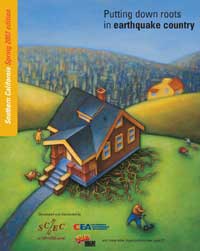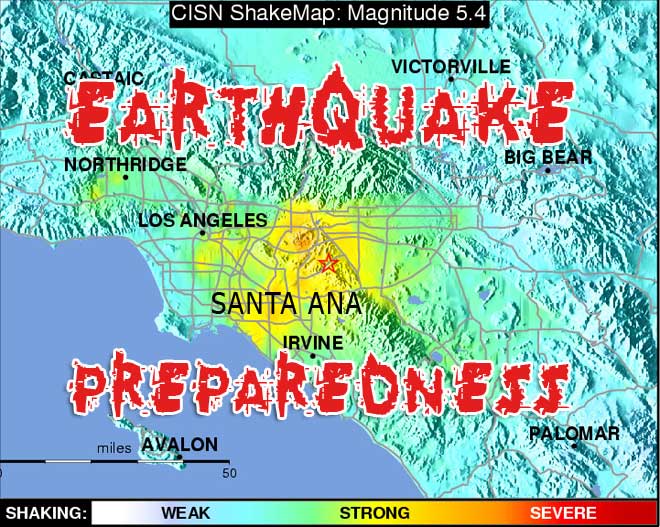 Earthquake and Disaster Preparedness
Earthquake and Disaster Preparedness
Updated July 11th 2014
hopefully the links still work in 2021. We'll check soon.
The American Red Cross spoke at the WSNA General Meeting on July 10th 2014 and provided preparedness info and resources. This page has been updated to incoporate the latest information. Red Cross Earthquake page, Red Cross Ready Checklist.
The Red Cross has a free smartphone earthquake alert app for Apple and Android. Information here. They have a companion first aid app here.
The earthquake app will notify you of a shaker right after it happens using USGS data. Make sure to set the threshold to 3 or above or you'll constantly get notices of little quakes. By default it's set to 4.5. You will get push notifications on your phone. You can also get emails from USGS (see below)
The Red Cross handed a list of preparedness links whice were added to our list (see below)
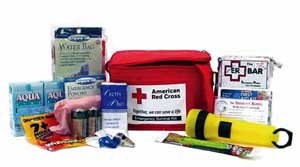 Speaking of which...do you have an earthquake kit for your family? Do you have one in your car and at your workplace too? Here's a guideline from the SAFD (old but still applicable) A trip to the Target or Walmart sporting goods department might be in order. Gather the items together and seal them in a waterproof, crushproof container (or containers) and put them in an accessble place. That might be in a shed in the backyard, in your garage if you have an access door other than the tilt-up or roll up door or somewhere out of harm's way in your yard. A big clean garbage can will hold a good sized kit. Remember to pack it and seal it for life in the elements.
Speaking of which...do you have an earthquake kit for your family? Do you have one in your car and at your workplace too? Here's a guideline from the SAFD (old but still applicable) A trip to the Target or Walmart sporting goods department might be in order. Gather the items together and seal them in a waterproof, crushproof container (or containers) and put them in an accessble place. That might be in a shed in the backyard, in your garage if you have an access door other than the tilt-up or roll up door or somewhere out of harm's way in your yard. A big clean garbage can will hold a good sized kit. Remember to pack it and seal it for life in the elements.
Work out a meeting plan with your family members so they know what to do if they're away from home when disaster strikes. The SAFD also suggests a small emergency kit for your car and workplace. Talk to your children about what could happen and what they should do if they're at school or away from home. Here's a FEMA page for kids. They should know what natural gas smells like and what to do if they smell it.
 Take some time to think about what you would do and what you would need to survive if a major quake hits our area and your home is unsafe to enter. There will be aftershocks for some time to come and you don't want to be inside when a large one hits.
Take some time to think about what you would do and what you would need to survive if a major quake hits our area and your home is unsafe to enter. There will be aftershocks for some time to come and you don't want to be inside when a large one hits.
What would you do if there were no electricity, no phone service, no running water, no gas, closed stores, damaged roads, no EMT services and no police for a week? It could happen here. If there's a lot of damage, even your cell phone may not work for a while. sf72.org will help you formulate a plan and a kit. The site is from San Francisco Emergency Management but the info is universal, especially the supplies page.
You'll need food and water, a first aid kit, cash, an emergency radio, flashlights and spare batteries, toilet paper (& maybe a shovel) clothing, shoes, a place to sleep, a way to charge your cell phone, don't forget your pets --they need food too...the list goes on. THINK ABOUT IT NOW! A little training and preparation now will make a big difference. Click one of links below and look at the recommendations. Buy an led flashlight or two and stash them in your kit. The new crop of them produce as much or more light than a traditional bulb and use far less battery power.
 Do you have valuable art and/or collectibles on shelves? Pick up some museum putty and stick them down now. Five bucks worth of putty may save thousands, even if the shaking is minor. Make sure all your kitchen cabinets and cupboards close securly.
Do you have valuable art and/or collectibles on shelves? Pick up some museum putty and stick them down now. Five bucks worth of putty may save thousands, even if the shaking is minor. Make sure all your kitchen cabinets and cupboards close securly.
Do you know how to turn off your gas, water and electric? Knowing where and how could prevent a fire or explosion. For Gas, you'll need a large adjustable wrench. Better yet, install an earthquake valve now. Of course, after an earthquake use your head and smell around for leaks. You don't want to turn off the gas unless you need to because it may be a long time before the gas company can send someone out to turn it back on. Unless you know exactly how to light each and every pilot light, leave that job to a professional.
In Washington Square, most of our water and gas valves are in "vaults" in the parkway in front of your house. That's where the main valves are but there may be another shutoff where the utilities enter your home. Take a walk and figure out were they are and what you need to shut them off. 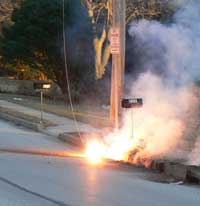 Your main electric box near the service entrance will have a main circuit breaker (or fuse if it hasn't been updated) that cuts off the power to the whole house. It's probably marked 100 or 150. After a quake make sure the overhead wires haven't fallen before you go near the service entrance.
Your main electric box near the service entrance will have a main circuit breaker (or fuse if it hasn't been updated) that cuts off the power to the whole house. It's probably marked 100 or 150. After a quake make sure the overhead wires haven't fallen before you go near the service entrance.
If you have an emergency generator make sure you test it on a regular basis and replace the fuel if it's stored for several years. Keep plenty of long heavy extensions on hand because you never want to hook it up to your house wiring unless you have the right equipment installed at your service entrance.
Speaking of power, why not go solar? In an emergency where the power may be out for days or weeks, your source of information may be your smartphone or a battery powered radio. How will you change those? Solar makes the most sense for the long haul.
Something  small like this is better than nothing but will have limited usefullness in an emergency. This 1.2W unit ($28 at Amazon) combines a solar panel with a rechargeable battery. It will charge a phone to 50% in 8 hours. iPad, forget it.
small like this is better than nothing but will have limited usefullness in an emergency. This 1.2W unit ($28 at Amazon) combines a solar panel with a rechargeable battery. It will charge a phone to 50% in 8 hours. iPad, forget it.
What you need is a larger panel like this 14 W foldable panel ($70 at Amazon). It will charge two devices simultaneously in the sun or one iPad. It will charge anything with a USB cable that needs 2.1 Amps or less.
less.
Will your cellphone work after a major quake? Maybe but the cell sites have battery backups with a limited life so don't counton it after a day or so. The next step would be a 100W panel ($185 Amazon) that you can mount on your garage roof or just put out in the sun. That through a controller will charge a deep cycle battery and power for phones, a few lights and maybe a laptop or small tv.
would be a 100W panel ($185 Amazon) that you can mount on your garage roof or just put out in the sun. That through a controller will charge a deep cycle battery and power for phones, a few lights and maybe a laptop or small tv.
You can add additonal panels and batteries to increase the capacity.
Want to power a refrigerator? It's possible but to get the power needed would cost thousands and require permanently mounted large panels. You might be better off with a generator..
Get to know your neighbors. We take a lot of pride in our neighborhood and one of the things that makes Washington Square different than a lot of California neighborhoods is that residents tend to get to know their neighbors. Your neighbor may be your best friend in an emergency. We'll have to pool resources and talents to survive the first few days without services. Find out who lives around you and what they have that can help. For example, someone with a pool can provide water for many households. If you have an elderly neigbor or one with health problems make it your responsibility to check up on them if a quake occurs.
 At the January 2006 General Meeting, the Santa Ana Fire Department talked about the importance of emergency preparation and the City programs to help.
At the January 2006 General Meeting, the Santa Ana Fire Department talked about the importance of emergency preparation and the City programs to help.
The Fire Department offered CERT training (Community Emergency Response Team). It's a national program designed to give you the skills to help your family and your neighbors in the event of a catastrophic disaster. Community services like police and fire may be unable to respond for three days or more in a disaster, would you know what to do? It's a program that teaches:
• Disaster Preparedness
• Fire Supression
• Disaster Medical Operations
• Light Search and Rescue
• Disaster Psychology and Team Organization
• Terrorism and CERT
Since the Orange County Fire Authority took over firefighting responsibilities for Santa Ana, the program is no longer offered. Possibly the city will offer classes in the future. WSNA will let you know if they do.
 CERT volunteers may come through the neighborhood to help where they can and pave the way for police and fire. They will be wearing green vests and helmets and have been trained in first response basics. They'll need to know how many people live in the homes around you and if there are any casulties. Remember that they're volunteers and won't be driving fire engines. They're trained, willing to help and may be your only help for several days. Please take the CERT classes if you can, Washington Square needs many more trained volunteers.
CERT volunteers may come through the neighborhood to help where they can and pave the way for police and fire. They will be wearing green vests and helmets and have been trained in first response basics. They'll need to know how many people live in the homes around you and if there are any casulties. Remember that they're volunteers and won't be driving fire engines. They're trained, willing to help and may be your only help for several days. Please take the CERT classes if you can, Washington Square needs many more trained volunteers.
 Here's something you might not have thought about: what would you do if all the computers in your home and office are destroyed. So many of us keep so much of our lives in our computers, how can you salvage your data after a disaster? One way might be to backup your most important files online so you can access them later to rebuild your life.
Here's something you might not have thought about: what would you do if all the computers in your home and office are destroyed. So many of us keep so much of our lives in our computers, how can you salvage your data after a disaster? One way might be to backup your most important files online so you can access them later to rebuild your life.
Earthquake or not, it's probably a good idea. Sign up for a free email account from GMail, Yahoo or AOL. Send all of your personal info to that address and use it for nothing else. Don't give out that email address to anyone except your family. GMail gives you 15 GB of storage now, enough for most of your photos and doccuments. Just send yourself something on a monthy basis to keep the account active. There's a 25MB attachment size limit to most of the services. For bigger files and more capacity consider a free or paid cloud storage solution.
Microsoft offers 7GB of free online storage with OneDrive and more free when you refer friends and family. There are many more iCloud from Apple. Dropbox, Box, Google Drive and MediaFire. MediaFire gives you 50GB of storage for free and 1TB of storage for $25/year. You can upload files up to 20GB so you can backup all your photos and your digital videos as well. Their facility is in Texas, away from earthquake country. Make sure whatever service you use is secure and not a public sharing site like Flikr.
Scan your important doccuments like passports, birth certificates, credit cards, insurance information, etc and upload it. If you have a address book in a program like Outlook, export your contacts and upload them. If you do your taxes yourself, upload your TurboTax files. Take pictures of your home, your valuables your family members and your pets and upload them. Remember to update your information regularly!
Putting Down Roots in Earthquake Country A comprehensive guide to living here from the Southern California Earthquake Center. 9MB pdf It's a very well done guidebook, our recommendation: download it, print it out, read it with your family and put it in your earthquake kit. It was last updated in 2011. Their download site is here if you want to download the Spanish language version.
The Earthquake Preparedness Handbook from the LAFD (4MB pdf)
Preparedness from the American Red Cross
Tip Sheets from the State of California Emergency Management
Guardian Insurance has a good earthquake preparedness article.
There are commercial earthquake kits available from many sources. Here are a few (with no endorsement)
Costco Emergency Kits & Suppies
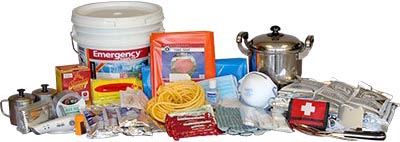 Do you have a great kit put together already and want to share ideas with your neighbors? This is an on-going program from WSNA that needs your help. Email webmaster@washington-square-org with your ideas and suggestions and we'll post them here.
Do you have a great kit put together already and want to share ideas with your neighbors? This is an on-going program from WSNA that needs your help. Email webmaster@washington-square-org with your ideas and suggestions and we'll post them here.
More resources:
Southern California Earthquake Center
USGS Earthquake Notification Service - get quake notification sent to your text or email. The Red Cross App uses the USGS data and send push notifications to your phone.
Animated Shakemaps from CalTech
We Ready.org Caribbean earthquake preparedness plus a Reggae version of Drop Cover and Hold On. Good info.
Ready America Kits and preparedness from FEMA
Are you ready to ride it out? Orange County Fire Authority
Know your local hazards. Enter your address and see what can affect Washington Square myhazards.calema.ca.gov
Welfare Inquiry and Status - After a disaster list your status on this Red Cross site so family and loved ones can find you safeandwell.org
Orange County Mass Public Notification - Sign up for emergency notifications on your phone from the County AlertOC.com
October readness test shakeout.org
Federal Emergency Management Agency fema.gov
California Emergency Management Agency calema.ca.gov
Federal govt all hazards preparedness site ready.gov
News and Activity Information

